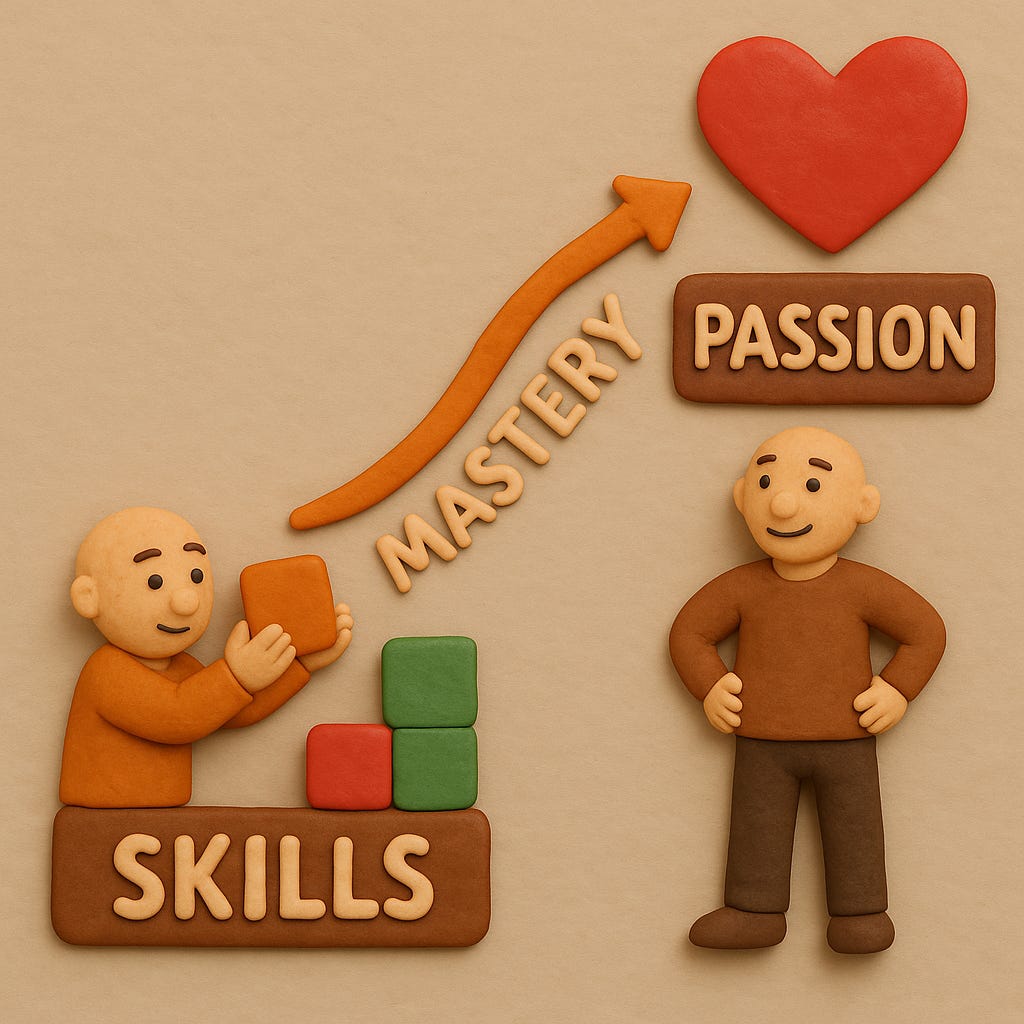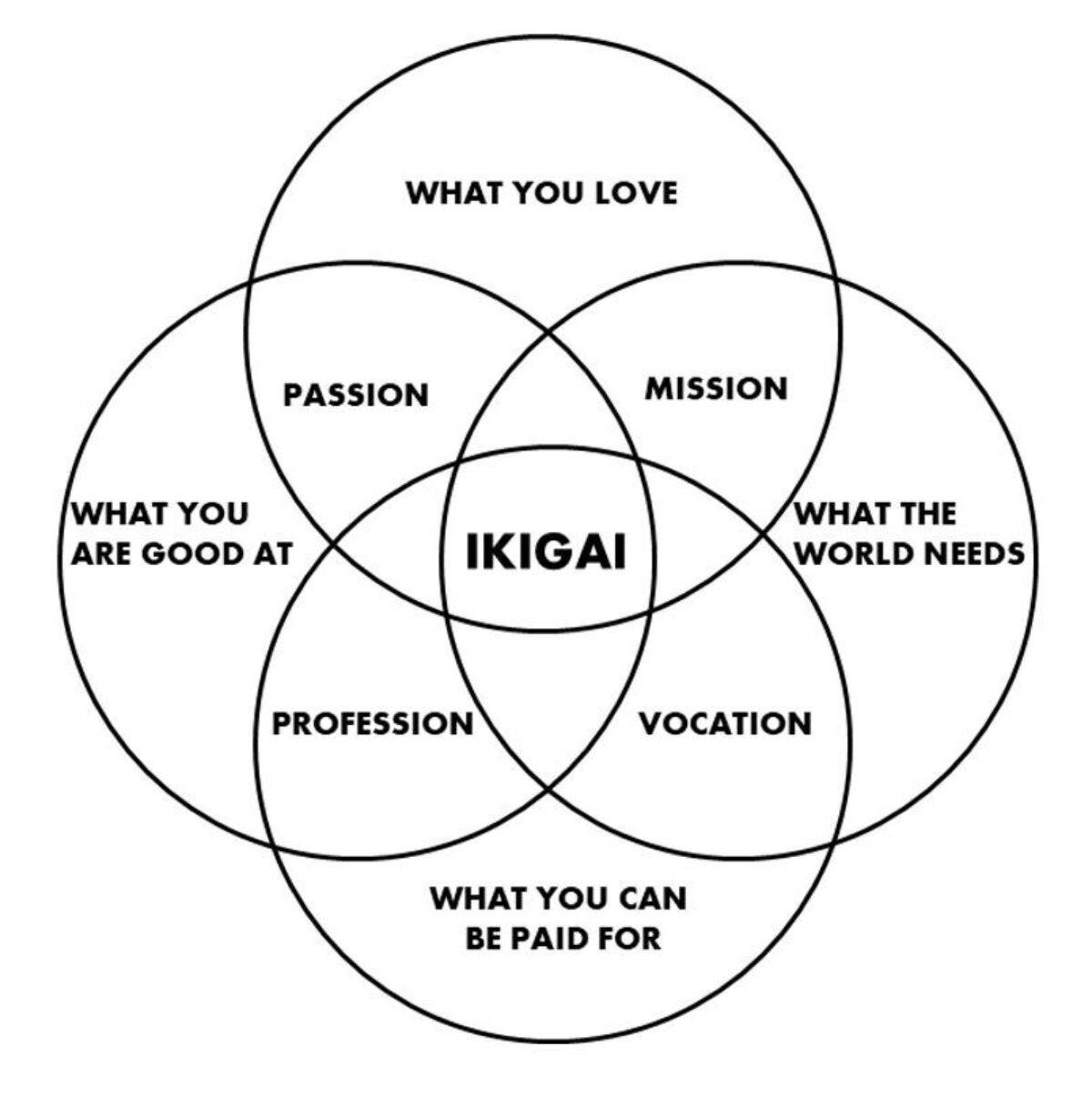Why You Shouldn’t Follow Your Passion (and What to Do Instead)
Lessons from Steve Jobs, Cal Newport, and 80,000 Hours
"Do what you love, and you'll never work a day in your life."
Everybody knows this quote, repeated countless times and often presented as the ultimate career advice. However, I’d argue that this way of thinking isn’t always optimal when pursuing a fulfilling career. In fact, there are better alternatives and ways that focus on skill development and growth rather than simply chasing passion.
This post is about rethinking the passion-first approach to work and career and replacing it with a path that’s far more practical, sustainable, and, ultimately, fulfilling.
Output Theory is a reader-supported publication. To receive new posts and support my work, consider becoming a free or paid subscriber.
Because the truth is, most people don’t find their passion. They build it.
💭 The Myth of "Follow Your Passion"
The idea of "following your passion" has been romanticized for decades. It’s a comforting thought: if you just find what you love, everything else will fall into place. But is it really that simple?
🧠 Steve Jobs and the Passion Paradox
In 2005, Steve Jobs delivered one of the most memorable commencement speeches at Stanford University. It’s an amazing speech and I thoroughly recommend listening to it. He famously urged graduates to "find what you love" and pursue it relentlessly. While his words were inspiring, his own career path tells a more nuanced story.
Jobs had many passions early on. He loved calligraphy. He was obsessed with Zen Buddhism. For a while, he didn’t seem to care about tech at all.
But he didn’t become a calligrapher or a Zen master. Instead, he built skills in technology and entrepreneurship, which eventually led to the creation of Apple and Pixar. His passion for these companies wasn’t pre-existing; it developed as he became deeply skilled and invested in his work.
This suggests that passion isn’t always the starting point. Often, it’s the result of mastery and dedication.
⚠️ The Danger of Turning Passion into a Job
Even when passion leads to a career, it’s not always a smooth ride. Take Ed Sheeran, for example. In an interview, he mentioned that music, once his greatest passion, has now become his job. While he still loves it, the pressure and demands of his profession have changed his relationship with it.
This highlights a potential pitfall: when passion becomes a profession, it can lose some of its magic. The key, then, is to find fulfillment not just in what you love, but in what you’re good at.
🔧 Passion is built, not found
If passion isn’t the starting point, what is? I’d argue that skill development is the real foundation of a fulfilling career.
🔁 The Mastery-Passion Cycle
Here’s how it works: you start by building skills in a particular area. As you become more competent, you gain confidence and satisfaction. Over time, this mastery leads to passion. In other words, passion often follows skill, not the other way around.
This idea resonates with me deeply. I’ve experienced it firsthand in my own career. Years ago, I was in a job that drained me, despite being surrounded by great people. I realized I had to make a switch, and today, I’m thoroughly fulfilled by what I do and enjoy my work every single day. I did not chase a specific passion, but rather I studied what makes a career fulfilling and built skills that would move me in that direction.
The following beliefs and resources helped me take the steps to realign my path:
🔧 Passion is often a byproduct of skill, not a prerequisite
💎 Career capital—rare and valuable skills—is the true foundation of fulfillment
🎯 The best careers are built at the intersection of curiosity, usefulness, and skill
🧭 Tools like ikigai and the “80,000 Hours” framework help clarify your direction
🗽 Freedom comes from competence and autonomy
Let’s break this down into focused parts:
🔍 Skill and curiosity beat vague dreams
Cal Newport’s book So Good They Can’t Ignore You features an interesting reframe.
He too argues that the advice to “follow your passion” is misleading—and that what really matters is career capital.
💼 What Is Career Capital?
Career capital refers to a unique set of skills that are highly valuable to others. It’s what makes you indispensable in your field. Unlike generic skills, career capital is often a combination of specialized knowledge, experience, and interests that set you apart.
For example, Steve Jobs’ career capital wasn’t just his technical expertise—it was his ability to combine technology with design and storytelling. This unique mix made him a visionary leader.
To build career capital, you need to follow your genuine curiosity.
The following is one of my favorite quotes which helps to identify where your genuine curiosity lies:
“Find what feels like play to you, but looks like work to others.” — Naval Ravikant
🧩 The Role of Curiosity & Ikigai
Curiosity plays a crucial role in this process. Instead of chasing what’s "hot" or trendy, focus on what genuinely interests you. Follow your curiosity, and you’ll naturally develop skills that are both valuable and personally meaningful.
This aligns with the Japanese concept of ikigai, which defines fulfillment at the intersection of:
What you’re good at
What you love
What the world needs
What you can get paid for
Find the center of that diagram, and you’ve found something that feels meaningful and sustainable.
The beauty of ikigai is that it doesn’t expect you to “just know.” It expects you to build toward that intersection.
And with skill comes leverage: the ability to choose your projects, set your schedule, and work with people you like. Autonomy isn’t handed to you, it’s earned through being useful.
📚 Six Evidence-Based Drivers of Career Satisfaction
There’s a free book I highly recommend called 80,000 Hours by the nonprofit of the same name. It’s based on scientific research into what actually makes work fulfilling.
It distills the science of meaningful work into six key drivers:
💖 Work that helps others
Impact matters. Helping people creates purpose. The average doctor, for example, is estimated to save 100–120 lives over a career. But here’s the kicker: donating to highly effective nonprofits can save just as many lives for a fraction of the time and cost.💡 Work you’re good at
Competence leads to enjoyment. The better you get, the more you enjoy the process. And the better outcomes you generate.🎯 Engaging work
You want the right balance of skill and challenge. That “edge of your ability” zone is where the popular flow state happens.👥 Supportive colleagues
No surprise: you become the people you spend time with. Healthy, collaborative environments matter more than job titles.🚫 No major negatives
Low pay, toxic coworkers or long commutes are things that crush satisfaction, no matter how good your job sounds.⚖️ Fit with the rest of your life
Your job should fit your life, not dominate it. Autonomy, flexibility, and alignment with your values are key.
Did you notice what’s not on that list? “Follow your passion” or “maximize income.”
Money matters—but only to a point. Beyond covering your needs and some comforts, more money adds little to happiness
🧗 Mastery, then autonomy, then fulfillment
When you build skill and make yourself valuable, something powerful happens:
You earn autonomy.
Autonomy means freedom. Freedom to say no. Freedom to choose projects, clients, or even days off. Freedom to integrate your work into a life that actually makes sense.
Autonomy is what most people think passion will give them. But it’s not passion—it’s proving your value that creates that leverage.
Be so good they can’t ignore you. Then negotiate the terms that let you do your best work, your way.
🧪 How to put this into practice
If you're currently stuck orunsure where to go or what to do, stop waiting for some perfect passion to reveal itself. Here's a better approach:
👉 Pick a direction that feels promising and has room to grow
Don't overthink it. Just choose a field where skill compounds and impact matters.🔍 Follow your curiosity
Explore without pressure. Stay playful and open. Curiosity is more sustainable than raw passion.🧱 Stack skills
Build things. Help people. Document your process. That’s how career capital grows.🧭 Review often
Are you moving the right way? Is your work still aligned with your values? Adjust as needed.🏁 Redefine success
It’s not about the title or the paycheck. It’s about freedom, impact, and alignment.
And remember: if you’re off-track, pause. Don’t sprint further in the wrong direction. Reassess. Change course. Start again.
You’re allowed to change your mind. That’s part of the game.
The real takeaway
Don’t follow your passion. Follow your curiosity. Let that curiosity lead you to skills. Let those skills lead to impact. Let impact lead to autonomy. And let autonomy unlock a career—and a life—you’re actually excited to live.
As Steve Jobs said: “Stay hungry. Stay foolish.”
But most importantly… stay moving.
Until next time,
Tobi 🤗
📚 Resources
Here are the books, concepts, and talks referenced in this article:
🎓 Steve Jobs’ 2005 Stanford Commencement Speech
Watch on YouTube📘 So Good They Can’t Ignore You by Cal Newport
Get the book💭 Naval Ravikant on curiosity and leverage
Read Naval’s Almanack (free)📘 80,000 Hours: Find a fulfilling career that does good
Read online or get a free book🌱 Ikigai: The Japanese concept of purpose
Overview🧠 The six drivers of career satisfaction (From 80,000 Hours)
Explore the research summary





This post was so valuable to me at this stage in my career. Before reading, I felt I was starting over from scratch, having left a secure position in education to pursue an unpredictable career as a spiritual life coach. Now, I see that I have many skills that carry over, more skills/modalities that I am curious to learn, and a career path that will lead to autonomy.
Interesting take. In my case, following my passion did work.
Since I was a child, I wanted to be a teacher. While other kids played with toys, I played "school" teaching my younger siblings and neighbors in front of an oversized blackboard. By the end of each day, my hands were covered in chalk. I felt such joy that I could feel energy radiating from my core, completely immersed in a state of flow.
That feeling never left me.
I've spent my entire life in education, teaching at every level, from primary school to PhD programs, and now working with corporate executives. My passion hasn’t decreased. It’s deepened. I’ve always felt competent in this work because it’s aligned with who I am. When I’m teaching or facilitating a learning experience, it’s as if the entire world disappears. Time vanishes. It’s just me, my learners, and the experience we create together.
Of course, I’ve acquired and honed my skills over the years and put in thousands of hours of practice. But I didn’t follow curiosity from the start. I followed a strong impulse that already lived within me. And to this day, it continues to guide and fulfill me.
Maybe not everyone feels such a clear inner pull, but for me, following it was the right path.